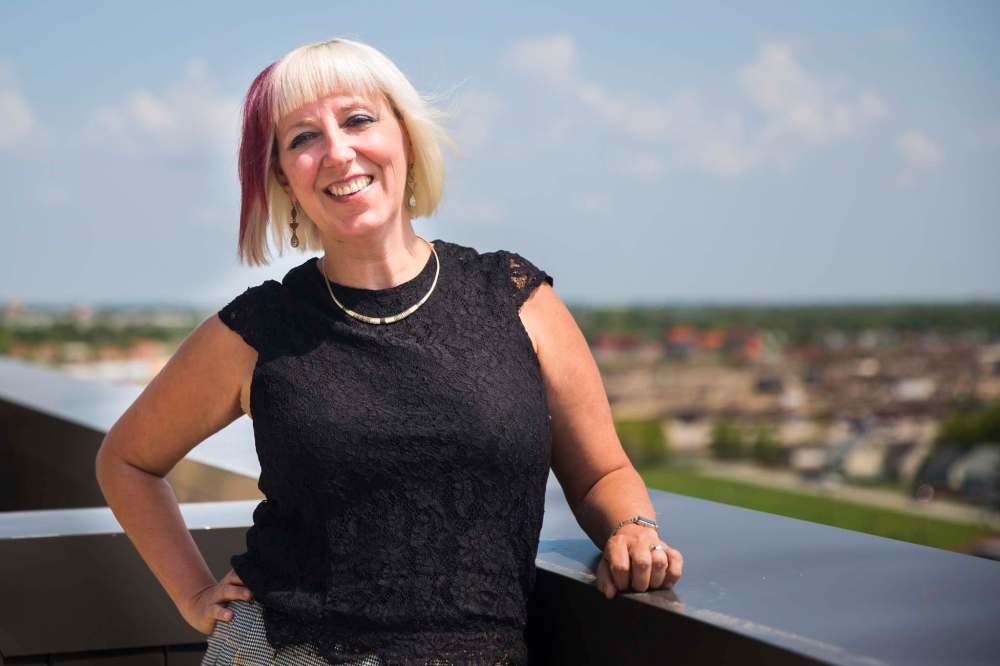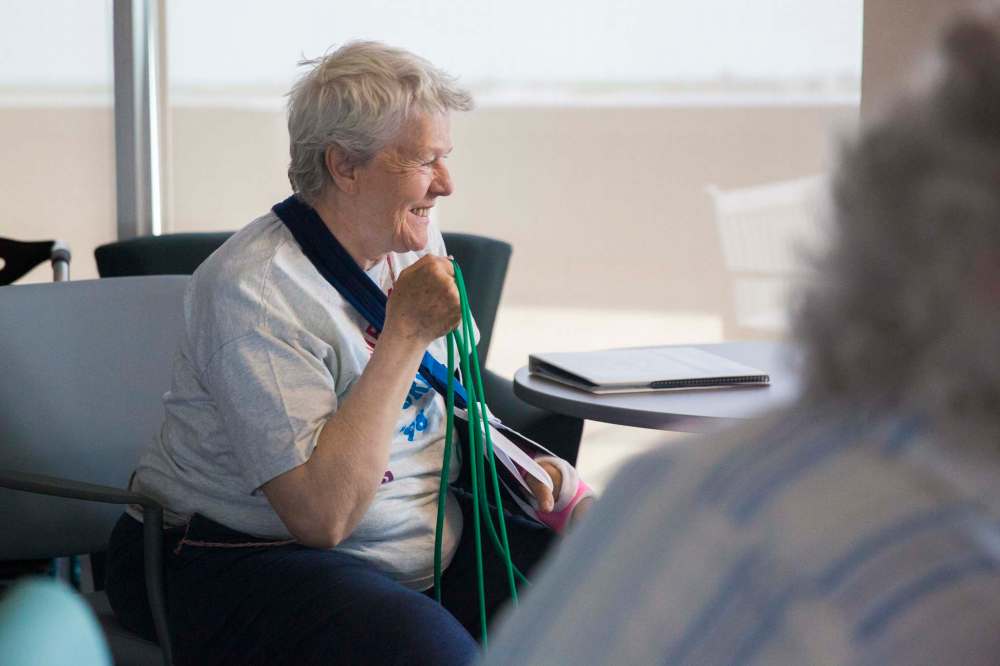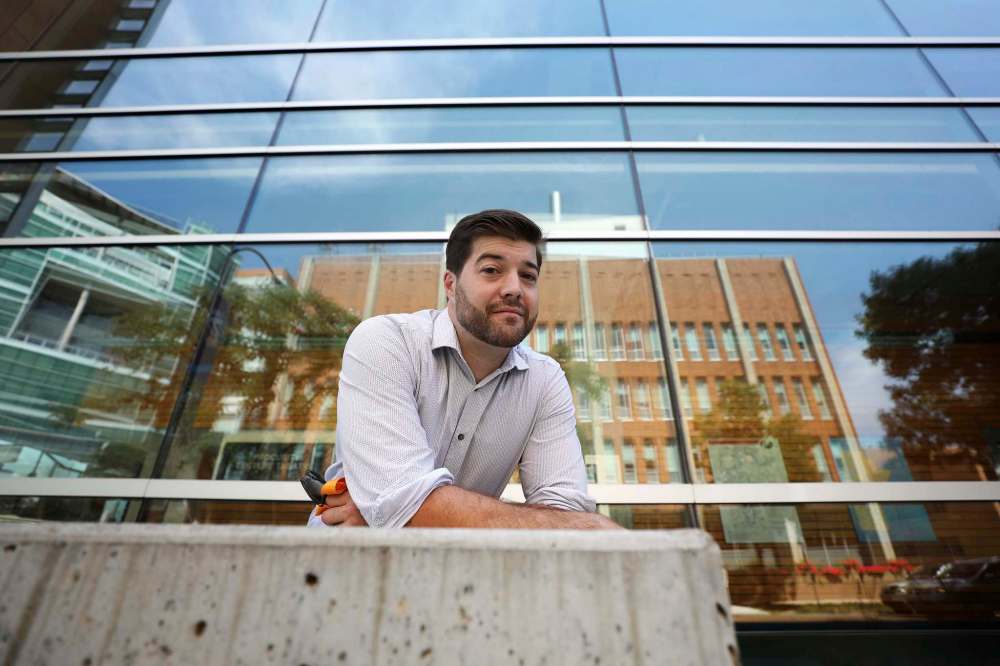Peer-led health program proves empowering
Hans Kai a social gathering that acts as a community wellness group
Advertisement
Read this article for free:
or
Already have an account? Log in here »
To continue reading, please subscribe:
Monthly Digital Subscription
$0 for the first 4 weeks*
- Enjoy unlimited reading on winnipegfreepress.com
- Read the E-Edition, our digital replica newspaper
- Access News Break, our award-winning app
- Play interactive puzzles
*No charge for 4 weeks then price increases to the regular rate of $19.00 plus GST every four weeks. Offer available to new and qualified returning subscribers only. Cancel any time.
Monthly Digital Subscription
$4.75/week*
- Enjoy unlimited reading on winnipegfreepress.com
- Read the E-Edition, our digital replica newspaper
- Access News Break, our award-winning app
- Play interactive puzzles
*Billed as $19 plus GST every four weeks. Cancel any time.
To continue reading, please subscribe:
Add Free Press access to your Brandon Sun subscription for only an additional
$1 for the first 4 weeks*
*Your next subscription payment will increase by $1.00 and you will be charged $16.99 plus GST for four weeks. After four weeks, your payment will increase to $23.99 plus GST every four weeks.
Read unlimited articles for free today:
or
Already have an account? Log in here »
Hey there, time traveller!
This article was published 29/07/2019 (2289 days ago), so information in it may no longer be current.
It’s doubtful that John Lennon and Paul McCartney had fitness in mind when they wrote their classic song With a Little Help From My Friends, but the support of friends goes a long way when you’re trying to take control of your health.
Let’s be honest: trying to develop a healthy lifestyle alone is hard. Social support can mitigate some of the challenges people face.
That’s why Hans Kai, a unique, peer-led health program that empowers its participants to take control of their health with the benefit of social support, can play a pivotal role in making positive lifestyle changes for many people.

Hans Kai operates much like a social gathering but with an emphasis on health. Think of it as a community wellness group. In Winnipeg, participants meet regularly at NorWest Co-op Community Health Centre and cover topics such as healthy eating, stress management, meal planning and exercise.
Hans Kai is a Japanese phrase that means “group meeting.” The program originated in Japan after the Second World War as a way for people to check their own health when medical services were limited. It was brought to Canada in 2010 by NorWest and Co-op Sante Robert-Cliche in Beauceville, Que.
There are now 18 groups in Winnipeg with 284 participants, and the program has spread across the country. Groups have popped up in Saskatchewan, British Columbia, New Brunswick and Nova Scotia.
“(Hans Kai) empowers participants to make their own health choices,” says Michelle Kirkbride, NorWest’s community development co-ordinator. “It provides an opportunity for participants to have an active role in improving or maintaining their own health and well-being.”
Hans Kai is based on group accountability and equips participants with the skills to take an active role in managing their own health. It’s based on the idea that people who spend time together monitoring their health will live longer, healthier lives.
“Our Hans Kai members say that the social interactions they make within the group help keep them on track to meet their health goals,” Kirkbride says. “And because we encourage the sharing of goals, we believe group accountability keeps people coming back.”
Aline Cardiff, 71, is diabetic. She got involved with Hans Kai more than a decade ago. She heard about the program through a women’s group at NorWest.
“Back then, we got together once a week. It was a fun group. We did our exercises, blood sugar, blood pressure and we’d talk about our week and what we had going on.” she says.
Cardiff found a welcoming group of people who helped her come out of her shell.
“I’m normally quite shy and it was difficult for me to talk openly. The group helped me talk to people. We’d play cards, chat and eat healthy snacks instead of opting for chocolate bars and chips,” she says.
Kirkbride says Cardiff has shown incredible resilience.
“Aline believes in Hans Kai so much and really pushed to get her current group together,” Kirkbride says. “She’s become a strong community leader.”
Hans Kai has given Cardiff a renewed sense of belonging.

“I really like coming here,” she says. “The best part is socializing, making friends and just getting to know people again.”
The program starts with participants completing a free, nine-week health school that covers goal setting and focuses on healthy eating, physical health markers, fitness and ways to manage stress.
Health school not only encourages participants to be mindful of their personal health, but helps people build supportive relationships and prepares them to meet independently.
“Once health school is complete, groups decide how often to meet. Most meet weekly,” Kirkbride says. “Groups conduct self-health checks, engage in physical activity, eat a healthy snack and socialize.”
And because groups are self-directed, participants decide collectively how their group will run. Every Hans Kai meeting must include the four core activities: social interaction, healthy snack, monitoring health indicators and physical activity.
“Groups must check their blood pressure, blood sugar and waist circumference at least once a month,” she says.
Kirkbride leads the program along with NorWest’s Mike Sadlowski. They both worked with a steering committee to develop content and have since consulted with health professionals to continue to improve the project.
There’s no charge to join a Hans Kai group and NorWest takes on as many participants as it can handle, although it has found 10 to 20 works best.
Previous Hans Kai focus groups and research indicates participants improved their mental health, made lifestyle changes and showed a significant increase in physical activity, Kirkbride says.
Hans Kai is not designed to replace a visit to your physician.
“The program is meant to give participants a better understanding of what their doctor checkup is all about. It also keeps them on track with a healthy lifestyle in between visits to a doctor,” Kirkbride says.
In 2018, NorWest approached the University of Manitoba about doing research on Hans Kai to evaluate the program. Dylan MacKay, an assistant professor in the department of community health sciences, wrote a trial protocol and worked with NorWest to develop a clinical trial.

“The trial will look at outcomes related to mental health, diet, loneliness and isolation. These will be measured by a questionnaire,” he says. “Physical activity will be measured using pedometers and other health outcomes like blood pressure, body weight, waist circumference and blood sugar will be measured by a registered nurse.”
The trial started in May and MacKay says they are still recruiting. The first results won’t be analyzed until each participant has completed six months of the trial.
MacKay is interested to see if the Hans Kai program improves participants’ mental health.
“Since it’s a program that looks to connect people, it may improve people’s social connections which could help with feelings of social isolation or loneliness and improve mental health,” he says.
For MacKay, Hans Kai hits close to home.
“I was diagnosed with Type 1 diabetes when I was 13. (That diagnosis) pushed me into health research, especially involving lifestyle and diabetes,” he says.
“Hans Kai incorporates healthy eating, exercise and monitoring blood sugar, so it’s a program that fits into my research interests really well.”
If you’d like to learn more about the Hans Kai program at NorWest Co-op Community Health Centre, contact Michelle Kirkbride at mkirkbride@norwestcoop.ca.
sabrinacarnevale@gmail.com

Sabrina Carnevale is a freelance writer and communications specialist, and former reporter and broadcaster who is a health enthusiast. She writes a twice-monthly column focusing on wellness and fitness.
Our newsroom depends on a growing audience of readers to power our journalism. If you are not a paid reader, please consider becoming a subscriber.
Our newsroom depends on its audience of readers to power our journalism. Thank you for your support.

